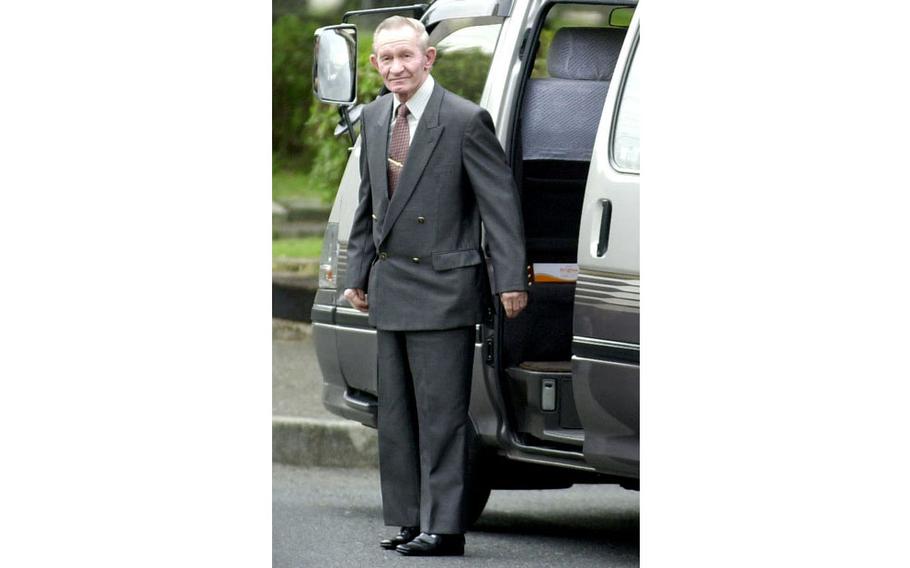
Sgt. Charles Jenkins arrives at Camp Zama, Japan, returning voluntarily to military control after allegedly deserting almost 40 years ago to live in North Korea. (Jim Schulz/Stars and Stripes)
SEOUL — The fate of Sgt. Charles Robert Jenkins — a U.S. soldier believed to have defected by walking across the border into North Korea during a 1965 Demilitarized Zone patrol — could go one of several routes, said lawyers and others observing the case.
The desertion case could end in a plea bargain satisfying the U.S. government’s desire to punish Jenkins without aggravating a Japanese public mesmerized by the case. Or, if prosecutors reject a plea agreement, Jenkins could be tried in a public court-martial.
Another option: Jenkins could request an other-than-honorable discharge in lieu of a court-martial, known as a Chapter 10. Government prosecutors would have to agree to such a settlement.
Neither military prosecutors nor defense attorneys have indicated publicly which way the case is likely to go. So far, the U.S. military hasn’t requested custody of Jenkins, 64, but is compiling a case against him. He is charged with desertion, aiding the enemy, two counts of soliciting others to desert and two counts of encouraging disloyalty, according to the U.S. embassy in Tokyo.
Jenkins, from Rich Square, N.C., disappeared on a freezing night while on ambush patrol in the DMZ on Jan. 5, 1965. He later was seen in propaganda films. In 1996, North Korea confirmed he and three other Americans thought to have defected in the 1960s were alive, although Jenkins reportedly has told Japanese officials two of the three are dead.
But the bizarre tale went further after Japanese Prime Minister Junichiro Koizumi traveled to North Korea in September 2002 to inquire about reported North Korean abductions of Japanese citizens. North Korean ruler Kim Jong Il admitted to 13 abductions.
In 1980, Jenkins — teaching English at the time — married Hitomi Soga, abducted by North Korean agents in 1978 to teach Japanese to the country’s spies. They have two children, Mika, 21, and Belinda, 18.
Jenkins may hold an intelligence trump card: 39 years of living in North Korea. That knowledge could be crucial to his defense, said James B. Craven III, a Durham, N.C.-based attorney retained by Jenkins’ family and working the case for free.
“He’s got to be debriefed,” Craven said. “Presumably he won’t object to that.”
A plea would be leveraged on that knowledge, Craven said.
“We want the criminal charges to go away in some fashion without any confinement.”
But Craven, a retired Navy lawyer, has never met with Jenkins.
Jenkins has met with Capt. James Culp, a military defense attorney based in South Korea. Culp is with Trial Defense Service, which provides no-cost counsel to military clients accused of crimes. Neither Culp, a Berkeley law graduate and former infantryman, nor TDS officials would comment for this story.
Jenkins, who left North Korea last month and now is receiving medical treatment in Japan, has been closely sequestered by Japanese authorities. Craven said he spoke about two weeks ago with a Pentagon legal official who had a copy of Jenkins’ charge sheet but would not send it to him.
The Associated Press has reported that Jenkins’ company commander approved a charge sheet on March 15, 1965. It contends that Jenkins “did, on or about 5 January 1965, without proper authority and with intent to remain away permanently, absent himself from his organization,” the AP reported.
That commander, Darrell E. Best, said Tuesday from his home in Hampton, Va., that he and Jenkins initially talked after discovering they both served in the same Germany-based Army unit at different times, Best said.
Jenkins was in his unit for only about three weeks before he disappeared on his first DMZ ambush patrol, Best said. After Jenkins disappeared, “Three or four weeks later he talked to us on the loudspeaker system the North Koreans had set up,” said Best, 69, who retired as a lieutenant colonel.
“As far as I’m concerned he’s still a deserter, and they’ve probably got a room reserved for him at Fort Leavenworth,” Best said. “I feel sorry for his Japanese wife but not for him. In the old days we used to shoot people who did that.”
Jenkins’ family argues that, like Soga, he could have been abducted. But Best said during tense firefights along the DMZ, the North Koreans were more interested in killing Americans than abducting them.